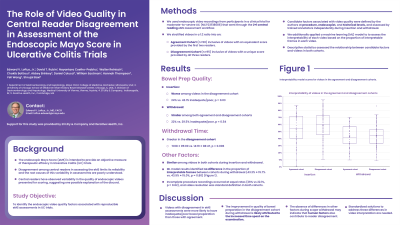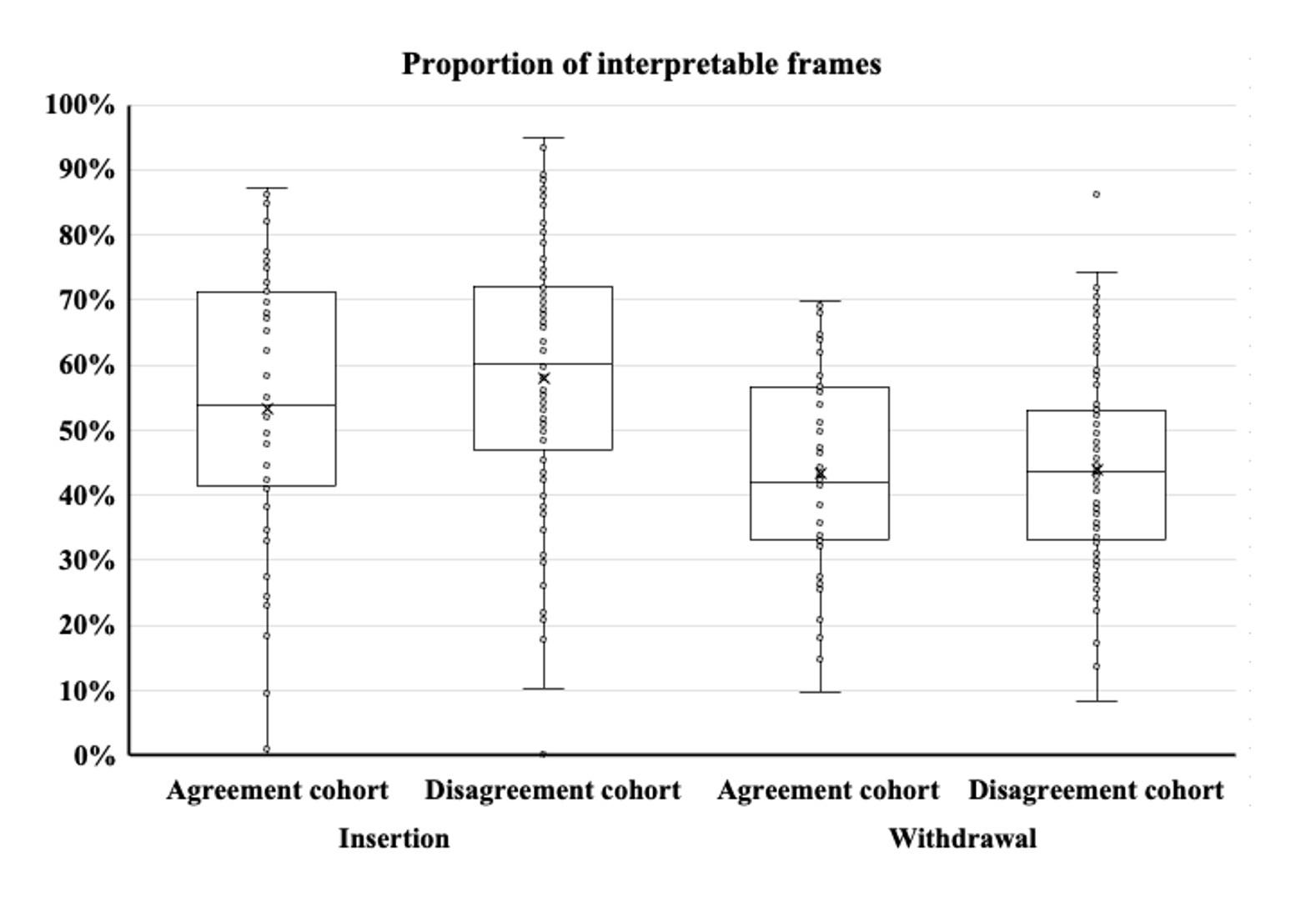Monday Poster Session
Category: General Endoscopy
P2395 - The Role of Video Quality in Central Reader Disagreement in Assessment of the Endoscopic Mayo Score in Ulcerative Colitis Trials
Monday, October 28, 2024
10:30 AM - 4:00 PM ET
Location: Exhibit Hall E


Edward V. Loftus, Jr., MD, FACG
Mayo Clinic College of Medicine and Science
Rochester, MN
Presenting Author(s)
Edward V. Loftus, MD, FACG1, David T. Rubin, MD2, Nayantara Coelho-Prabhu, MD, FACG3, Walter Reinisch, MD, PhD4, Chakib Battioui, PhD5, Abbey Brinkey, 6, Daniel Colucci, BS6, William J. Eastman, MD5, Hannah Thompson, 6, Yeli Wang, PhD6, Shrujal Baxi, MD7
1Mayo Clinic College of Medicine and Science, Rochester, MN; 2The University of Chicago Medicine, Chicago, IL; 3Mayo Clinic, Rochester, MN; 4Medical University of Vienna, Vienna, Wien, Austria; 5Eli Lilly and Company, Indianapolis, IN; 6Iterative Health Inc., Cambridge, MA; 7Iterative Health, Cambridge, MA
Introduction: The endoscopic Mayo Score (eMS) provides an objective measure of therapeutic efficacy in Ulcerative Colitis (UC) trials; however, disagreement among central readers in assessing the eMS limits its reliability. Central readers have observed variability in the quality of endoscopic videos presented for scoring, suggesting one possible explanation of the discord. We identified the quality factors associated with reproducible eMS assessments in UC trials.
Methods: We used endoscopic video recordings from participants in a clinical trial for moderate-to-severe UC that went through the 2+1 central reading eMS assessment workflow. We stratified videos in a 1:2 ratio into an agreement cohort (n=50) with videos with an equivalent score provided by the first two readers, and a disagreement cohort (n=95) with videos with a unique score provided by all three readers. Candidate factors associated with video quality were defined at procedure, endoscopist, and technical levels, and assessed by trained annotators independently during insertion and withdrawal. We additionally applied a machine learning (ML) model to assess the proportion of interpretable frames in each video. Descriptive statistics assessed the relationship between candidate factors and videos in both cohorts.
Results: Quality of bowel preparation was worse among videos in the disagreement cohort during insertion (24% vs 42.1% inadequate/poor, p=0.03), though similar during withdrawal (22% vs 29.5% inadequate/poor, p=0.54). Withdrawal time was greater in the disagreement cohort (11:08±05:00 vs 14:19±08:47, p=0.006). Other procedure and endoscopist factors were similar among videos in both cohorts during insertion and withdrawal (Table 1). ML model results identified no difference in the proportion of interpretable frames between cohorts during withdrawal (43.2%±15.7% vs 43.9%±15.0%, p=0.80) (Figure 1). Incomplete procedure recordings occurred at equal rates (26% vs 22.1%, p=0.62) and video resolution was standard definition in both cohorts.
Discussion: Videos with disagreement in eMS assessments in trials are those with a worse quality of bowel preparation. The improvement in quality of bowel preparation in the disagreement cohort during withdrawal is likely attributed to the increased time spent on the examination. The absence of differences in other factors during scope withdrawal may indicate that human factors also contribute to reader disagreement. Standardized solutions to address these differences in video interpretation are needed

Note: The table for this abstract can be viewed in the ePoster Gallery section of the ACG 2024 ePoster Site or in The American Journal of Gastroenterology's abstract supplement issue, both of which will be available starting October 27, 2024.
Disclosures:
Edward V. Loftus, MD, FACG1, David T. Rubin, MD2, Nayantara Coelho-Prabhu, MD, FACG3, Walter Reinisch, MD, PhD4, Chakib Battioui, PhD5, Abbey Brinkey, 6, Daniel Colucci, BS6, William J. Eastman, MD5, Hannah Thompson, 6, Yeli Wang, PhD6, Shrujal Baxi, MD7. P2395 - The Role of Video Quality in Central Reader Disagreement in Assessment of the Endoscopic Mayo Score in Ulcerative Colitis Trials, ACG 2024 Annual Scientific Meeting Abstracts. Philadelphia, PA: American College of Gastroenterology.
1Mayo Clinic College of Medicine and Science, Rochester, MN; 2The University of Chicago Medicine, Chicago, IL; 3Mayo Clinic, Rochester, MN; 4Medical University of Vienna, Vienna, Wien, Austria; 5Eli Lilly and Company, Indianapolis, IN; 6Iterative Health Inc., Cambridge, MA; 7Iterative Health, Cambridge, MA
Introduction: The endoscopic Mayo Score (eMS) provides an objective measure of therapeutic efficacy in Ulcerative Colitis (UC) trials; however, disagreement among central readers in assessing the eMS limits its reliability. Central readers have observed variability in the quality of endoscopic videos presented for scoring, suggesting one possible explanation of the discord. We identified the quality factors associated with reproducible eMS assessments in UC trials.
Methods: We used endoscopic video recordings from participants in a clinical trial for moderate-to-severe UC that went through the 2+1 central reading eMS assessment workflow. We stratified videos in a 1:2 ratio into an agreement cohort (n=50) with videos with an equivalent score provided by the first two readers, and a disagreement cohort (n=95) with videos with a unique score provided by all three readers. Candidate factors associated with video quality were defined at procedure, endoscopist, and technical levels, and assessed by trained annotators independently during insertion and withdrawal. We additionally applied a machine learning (ML) model to assess the proportion of interpretable frames in each video. Descriptive statistics assessed the relationship between candidate factors and videos in both cohorts.
Results: Quality of bowel preparation was worse among videos in the disagreement cohort during insertion (24% vs 42.1% inadequate/poor, p=0.03), though similar during withdrawal (22% vs 29.5% inadequate/poor, p=0.54). Withdrawal time was greater in the disagreement cohort (11:08±05:00 vs 14:19±08:47, p=0.006). Other procedure and endoscopist factors were similar among videos in both cohorts during insertion and withdrawal (Table 1). ML model results identified no difference in the proportion of interpretable frames between cohorts during withdrawal (43.2%±15.7% vs 43.9%±15.0%, p=0.80) (Figure 1). Incomplete procedure recordings occurred at equal rates (26% vs 22.1%, p=0.62) and video resolution was standard definition in both cohorts.
Discussion: Videos with disagreement in eMS assessments in trials are those with a worse quality of bowel preparation. The improvement in quality of bowel preparation in the disagreement cohort during withdrawal is likely attributed to the increased time spent on the examination. The absence of differences in other factors during scope withdrawal may indicate that human factors also contribute to reader disagreement. Standardized solutions to address these differences in video interpretation are needed

Figure: Figure 1: Interpretability model scores for videos in the agreement and disagreement cohorts.
Note: The table for this abstract can be viewed in the ePoster Gallery section of the ACG 2024 ePoster Site or in The American Journal of Gastroenterology's abstract supplement issue, both of which will be available starting October 27, 2024.
Disclosures:
Edward Loftus: AbbVie – Consultant, Grant/Research Support. Amgen – Consultant. Astellas – Consultant. AstraZeneca – Grant/Research Support. Avalo – Consultant. Boehringer Ingelheim – Consultant. Bristol Myers Squibb – Consultant, Grant/Research Support. Celgene – Consultant. Celltrion – Consultant. Eli Lilly – Consultant. Exact Sciences – Stock-publicly held company(excluding mutual/index funds). Fresenius Kabi – Consultant. Genentech – Consultant, Grant/Research Support. Gilead – Consultant, Grant/Research Support. Iota Biosciences – Consultant. Iterative Health – Grant/Research Support. Janssen – Consultant, Grant/Research Support. Merck – Consultant. Morphic Therapeutics – Consultant. Ono Pharma – Consultant. Receptos – Grant/Research Support. Sun Pharma – Consultant. Surrozen – Consultant. Takeda – Consultant, Grant/Research Support. TR1X Bio – Consultant. UCB – Consultant, Grant/Research Support.
David Rubin: AbbVie – Consultant. Allergan – Consultant. Altrubio – Consultant. Arena Pharmaceuticals – Consultant. Aslan Pharmaceuticals – Consultant. Athos Therapeutics – Consultant. Bellatrix Pharmaceuticals – Consultant. Boehringer Ingelheim – Consultant. Bristol-Myers Squibb – Consultant. Celgene Corp/Syneos – Consultant. Connect BioPharma – Consultant. Eli Lilly & Company – Consultant. GalenPharma/Atlantica – Consultant. Genentech/Roche – Consultant. Glycominds – Consultant. InDex Pharmaceuticals – Consultant. Ironwood Pharmaceuticals – Consultant. Iterative Health, Inc. – Consultant. Janssen Pharmaceuticals – Consultant. Materia Prima – Consultant. Pfizer – Consultant. Prometheus Biosciences – Consultant. Reistone – Consultant. Takeda – Consultant. Techlab – Consultant.
Nayantara Coelho-Prabhu: Iterative Health – Advisory Committee/Board Member.
Walter Reinisch: AbbVie – Advisory Committee/Board Member, Consultant, Grant/Research Support, Speakers Bureau. Amgen – Advisory Committee/Board Member, Consultant. AOP Orphan – Consultant. Boehringer Ingelheim – Advisory Committee/Board Member, Consultant. Bristol Myers Squibb – Advisory Committee/Board Member, Consultant. Calyx – Consultant. Celltrion – Advisory Committee/Board Member, Consultant, Speakers Bureau. Eli Lilly – Consultant. Ferring – Speakers Bureau. Galapagos – Advisory Committee/Board Member, Consultant, Speakers Bureau. Gilead – Consultant. Index Pharma – Consultant. Janssen – Advisory Committee/Board Member, Consultant, Grant/Research Support, Speakers Bureau. Medahead – Consultant. Microbiotica – Consultant. MSD – Speakers Bureau. Pfizer – Advisory Committee/Board Member, Consultant, Speakers Bureau. Roche – Speakers Bureau. Sandoz – Grant/Research Support. Sanofi – Grant/Research Support. Sobi – Speakers Bureau. Takeda – Consultant, Grant/Research Support, Speakers Bureau.
Chakib Battioui: Eli Lilly & Company – Employee, Stock-publicly held company(excluding mutual/index funds).
Abbey Brinkey: Iterative Health, Inc. – Employee, Stock Options.
Daniel Colucci: Iterative Health, Inc. – Employee, Stock Options.
William Eastman: Eli Lilly & Company – Employee, Stock-publicly held company(excluding mutual/index funds).
Hannah Thompson: Iterative Health, Inc. – Employee, Stock Options.
Yeli Wang: Iterative Health, Inc. – Employee, Stock Options.
Shrujal Baxi: Iterative Health, Inc. – Employee, Stock Options.
Edward V. Loftus, MD, FACG1, David T. Rubin, MD2, Nayantara Coelho-Prabhu, MD, FACG3, Walter Reinisch, MD, PhD4, Chakib Battioui, PhD5, Abbey Brinkey, 6, Daniel Colucci, BS6, William J. Eastman, MD5, Hannah Thompson, 6, Yeli Wang, PhD6, Shrujal Baxi, MD7. P2395 - The Role of Video Quality in Central Reader Disagreement in Assessment of the Endoscopic Mayo Score in Ulcerative Colitis Trials, ACG 2024 Annual Scientific Meeting Abstracts. Philadelphia, PA: American College of Gastroenterology.
